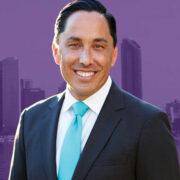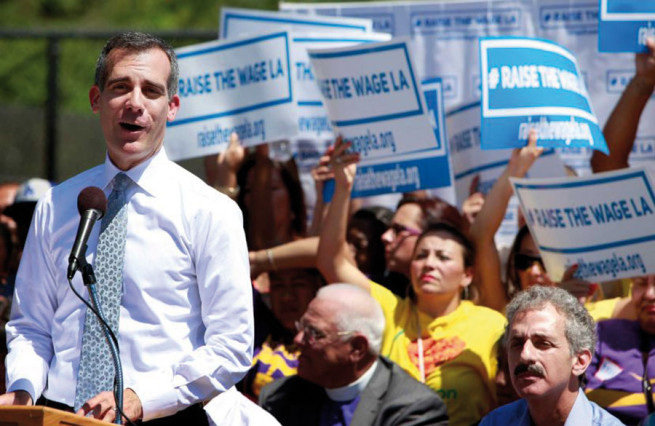LOS ANGELES officials voted Tuesday, May 19 on a fiercely debated plan to hike the city’s minimum wage to $15 an hour.
Under a plan endorsed by a key panel of City Council members, Los Angeles will increase its required wage year-by-year for the next five years to reach a minimum of $15 hourly by July 2020. The ordinance would boost the current wage for as many as 800,000 workers, officials say, and make LA the largest US city to adopt a major minimum-wage increase.
“Make no mistake, today the city of Los Angeles, the second biggest city in the nation, is leading the nation,” said Councilman Paul Krekorian, who was instrumental in shaping the wage increase plan’s final form.
The council’s 14-1 vote joins Los Angeles with Seattle, San Francisco, and other major West Coast cities that have boosted wages as part of a national campaign led by labor and community groups to reduce citywide poverty. The wage hike trend is sweeping cities across the nation, as elected leaders seek to address stagnating pay for workers.
Currently in LA, workers earn a state minimum wage of $9 an hour, which was set rise to $10 an hour in January under Mayor Eric Garcetti.
A key committee voting last week approved the main element of the new proposal adopted Tuesday, which will peg yearly wage increases based on the consumer price index over the past two decades. Backers say this provision to adjust base pay for inflation is key in addressing past failures of the act. In the final stages of the plan, Krekorian also sought to incorporate provisions that would ease the wage hike’s impact on businesses, many of which struggled.
Small businesses—those with 25 workers or fewer—would get an additional year to phase in the increases. Nonprofits that meet certain requirements could also ask permission to do the same.
The wage proposal would hike up pay slower than some activists wanted. However, last week leaders in the Raise the Wage Coalition approved of the sound plan to improve the standard of living for low-income workers and their families.
“[The city’s] leadership on raising the minimum wage makes it more real to pass it…on a broader basis, like the state and eventually federal level,” said Maria Elena Durazo, who works with the national labor organization Unite Here and is former head of the LA County Federation of Labor.
Business groups argue the strategy will backfire, as employees will cut jobs or leave the city altogether. The Los Angeles Area Chamber of Commerce and the Valley Industry and Commerce Assn. remain worried that automatic wage hikes would ultimately hurt the economy, and have been especially critical that they would threaten businesses.
“The very people [council members’] rhetoric claims to help with this action, it’s going to hurt,” said Ruben Gonzalez of the LA Chamber of Commerce. The only way for businesses to absorb the new labor costs, he added, would be to lay off employees, reduce their work hours, or even relocate.
“There’s simply not enough room, enough margin in these businesses to absorb a 50-plus percent increase in labor costs over a short period of time.”
The City Council’s vote came after months of public, often-emotional debate and back-room lobbying on the hot issue. Facing increasing pressure, the council was widely expected to approve wage increases of some kind. Recently, the debate has revolved around how much pay should increase and how quickly, rather than whether wages should increase at all.
Last year, Mayor Garcetti proposed boosting the city’s minimum hourly wage to at least $13.25 by 2017. Other city lawmakers have gone even further, pushing the wage to reach $15.25 by 2019. The proposal did not go as far, but still drew the ire of some business owners who supported the mayor in his 2013 campaign.
The hotel industry already made waves when it adopted an ordinance raising the base pay for workers to $15.37 an hour last year. The hotel worker pay increase, which was driven by a coalition of new councilmembers from diverse parts of the city, was seen by proponents as a precursor to a minimum wage hike for everyone.
Lawmakers have also wrestled with how the new rules should apply to small businesses, nonprofits and service employees who make extra money from tips.
Critics also attacked largely overlooked language in the wage proposal that could require employers to provide more paid time off to their workers. After Garcetti contended the paid-leave mandate needed to be studied, officials said they would hold off before pursuing such a requirement.
The council’s plan to endorse the minimum wage hike will be submitted to the city attorney’s office, where Atty. Mike Feuer will draft an ordinance to implement the new requirements. That draft ordinance would return to the council for a final vote before becoming a citywide law.
Afterward, the wage increase would be signed into law by the mayor, with the first wage boost—to $10.50 per hour—taking effect in July 2016. (With reports from Los Angeles Times)
(www.asianjournal.news)
(LA Midweek May 20-22, 2015 Sec. A pg.1)






